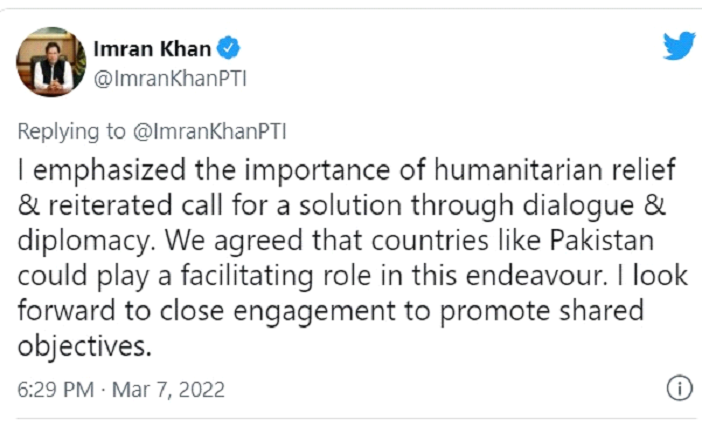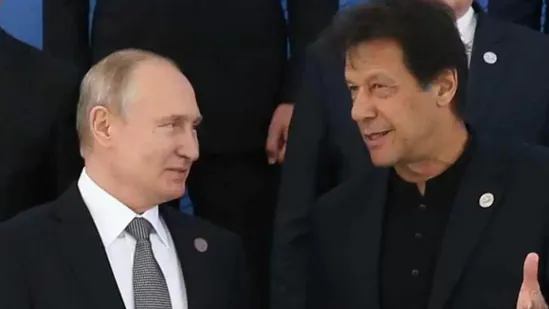Two back-to-back high-profile foreign trips by Pakistan’s head of government to the world’s most powerful capitals Beijing & Moscow is never a business-as- usual affair. These visits assumed more significance in the wake of the unfolding geopolitical events around Ukraine.
A rather emboldened PM Khan appears to be more confident after his Beijing and Moscow visits, though he now faces No-Confidence voting by joint opposition in the parliament. His calculus for selling his Moscow visit as a triumph may bring some respite if he manages to rally the people of Pakistan around his narrative on the new phase of Pak-Russia ties. His approach appears to be shaped primarily by domestic factors, instead of foreign relations, which may douse the fire of relentless criticism and bullying by Europe and US administrations.
Khan is poised to embrace a paradigm shift in foreign policies that may restore Pakistan’s ties with Russia to the Pre-1979 level.
Khan’s maiden visit to Moscow was a real thriller and a roller-coaster ride. He was having a one-on-one, high-level meeting with Putin, when the later had already ordered his armed forces to invade the country that borders Europe and considered to be the breadbasket of them since the cold war.
The pre-planned visit, a must go from Pakistan’s perspective, was inarguably more important for Pakistan than Russia. Since it was the first high-level official visit by any Pakistani head of state in 23 years, it was a well-worked out and calculated move by the PM and his team. It aimed at restoring the pre-Soviet Union era ties with Moscow for the revival of mutual trust, economic cooperation, rehabilitation of power plants, gas pipelines to meet Pakistan’s energy demands. It was disclosed later that the security cooperation including the intelligence sharing and weapons procurement were also either discussed or envisaged for future follow up.
World’s opinion:
A growing number of military and foreign policy experts are voicing concerns that PM could have postponed or even cancelled his visit instead of making a strong point for President Putin to prove to the world that despite his Ukraine invasion there are world leaders on his side who don’t care about human rights abuse and refrain from the condemnation of the attack on a sovereign state at Europe’s doorstep.
Pakistan vehemently stood up to its bold stance of not taking sides in the Russia-Ukraine conflict and preferred to abstain from the condemnation of Russia in the UN General Assembly, a move that irked the US and its European allies.

PM Khan, who reacted fiercely to the letter that 23 EU ambassador wrote to his government, urging him to condemn the Russian invasion of Ukraine, eventually told the EU council president Charles Michael, Pakistan could play the role of mediator, if possible, for de-escalation.

Implications
Antagonizing the US means getting hammered diplomatically and financially with stringent sanctions and facing isolation on the global stage.
Pakistan, on the face of it, is trying to inch away from pro-US position and to a more neutral stance or more trustworthy long-term friend to lean on but the neutrality, without a well-prepared homework, may lead to an increasingly untenable situation.
Pakistan has more to lose than gain by changing allies due to its already beleaguered financial status. Europe and the U.S aren’t dependent on imports from Pakistan as compared to India. India has huge bilateral trade with the west as well as the US including the IT exports, which makes a major chunk of its exports. Sanctions on Pakistan, on the contrary, can be debilitating for the struggling economy.
While signing the landmark trade and friendship enhancement agreements with Putin, PM Khan might have been feeling elated, but deep inside he must be wary of the fact that with a friend like Putin Pakistan can end up making a lot more adversaries.
Balancing tactics would mean keep going with old partners to avoid a severe backlash and collateral damage to own economy while consolidating ties with Moscow and Beijing. Not an easy balancing act.
Pakistan’s legitimate locus standi:
Every nation has a sovereign right to protect its legitimate security concerns. If India can blatantly put its national interests first to support Russia, then why not Pakistan?
Putin’s waging of war on Ukraine changed Europe’s perspective about American dependence. They understood that it cannot count on security guarantees from the US. The Russian invasion of Ukraine finally forced them to learn this lesson the hard way.
India is one among the five South Asian countries that abstained from voting against Russia, but it has successfully escaped the backlash. India has been an all-time biggest buyer of USSR/RUSSIAN arms. From 1950 till 2020 it bought almost $84 billion of a total of $127 billion, which makes an estimated 65 per cent of total transfer from only one country.
West considers India an indispensable ally and a reliable counterweight to China. But despite an international outcry it always managed to get away with its atrocities in Kashmir under its control with the connivance of the US and the NATO allies. This persistent invidious distinction makes a good case for Pakistan to review its volatile relationship with the American Bloc and join the regional superpowers, where its business interests and benefits will go a long way in achieving sustainability and viability.
The US had always been an apparent fair-weather friend but ditched Pakistan when it was needed the most. The idea of diplomatic fraternity and strategically shared values between Pakistan and the US was tragically flawed because it made us weaker and more vulnerable decades after decades. The unpredictability of the US has finally been acknowledged by the world and the cringeworthy slogan of “America First” finally and convincingly seems to be discredited. It was long overdue.
Closer ties with Russia at this critical juncture mean Pakistan can leverage the outcome of Imran Khan’s visit to show Washington that it is no longer a US client state. Also, the newly developed warmth between the two leaders will presumably soften Putin’s heart to morally support Pakistan’s stance in front of India. Pakistan can capitalize on this highly important visit in a critical moment of political history as far as Russia is concerned. It can also use the opportunity to outmaneuver its rival India.
Pakistan needs to look for a long-term strategic partnership, instead of tangential relations, something that Chinese and Russian leaders declared as No Limits and NO Forbidden areas of cooperation during the Beijing Olympics.
If PM Khan makes a legacy in the leaders’ hall of fame by following strategy instead of tactics and whims, he will be in the right direction. Pakistan has crossed the Rubicon. There is no time to look back.
Rafiq Jan. aeronautical engineer, planes enthusiast, author.




